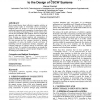Free Online Productivity Tools
i2Speak
i2Symbol
i2OCR
iTex2Img
iWeb2Print
iWeb2Shot
i2Type
iPdf2Split
iPdf2Merge
i2Bopomofo
i2Arabic
i2Style
i2Image
i2PDF
iLatex2Rtf
Sci2ools
123
click to vote
GROUP
2003
ACM
2003
ACM
Communities of action: a cognitive and social approach to the design of CSCW systems
Most current theories about collective cognitive activities in limited groups apply to structurally closed co-operative situations Here we propose to work in the framework of intellectual transactions and communities of action theory with a view to describing and designing CSCW systems which can be used in more structurally open situations. First we compare this approach with other theories of collective cognition (such as those focusing on situated cognition and communities of practice, distributed cognition and coordination mechanisms). We then present the core concepts involved in defining communities of action, the duality of goals and forms of knowledge and the operational, strategic, integrative and relational categories of collective activity on which the OSIR model is based. We conclude by presenting as an example the application of the model to a research project designed to assist the setting up of a health network. Categories and Subject Descriptors K.4.3 Organizational Imp...
Closed Co-operative Situations | Collective Cognition | Collective Cognitive Activities | GROUP 2003 |
Related Content
| Added | 05 Jul 2010 |
| Updated | 05 Jul 2010 |
| Type | Conference |
| Year | 2003 |
| Where | GROUP |
| Authors | Manuel Zacklad |
Comments (0)

